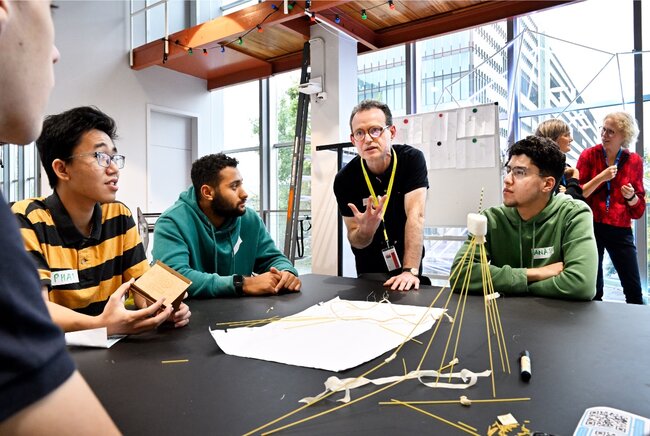Interview with Gert Guri

Hi Gert, what is your role in innovation Space?
I coordinate entrepreneurial learning. I have a double role, providing insight and input on improving entrepreneurial learning, mainly what we define as Challenge-Based Learning entrepreneurship courses. I also teach courses myself. At TU/e innovation Space we want to introduce students to entrepreneurship as a business opportunity, and something that allows them to have an impact. Impact can be social or business-wise, but entrepreneurial learning introduces a different mindset. It makes students understand that while developing technology, you need to think in advance about whom this will impact and how.
How did you land in this job?
Before I came to TU/e innovation Space I worked 10 years in innovation and entrepreneurship development with EiT digital, a consortium of 20 European technical universities. TU/e was one of those universities. I knew several colleagues already before joining TU/e, I knew from reports and visiting TU/e innovation Space how innovative it was. It felt like the right place for me, because here innovation happens. So I got the opportunity to coach students and work with innovative, open-minded colleagues, and I gladly joined. For me, when choosing a new position, not only the job description matters but also the people you are around.
Entrepreneurship makes students comfortable to move out of their comfort zone.
What value do you think students get from entrepreneurial learning?
Entrepreneurial learning is just like how life unfolds itself. No matter if you own a company or work in a company, in each project you must make sure that it is technically feasible. It also must be business viable, and you must consider the social impact and if the project is legally doable. So, these four components must be thought of in parallel beforehand. This will make a difference if you go to market and make an impact or remain a patented excellent technologic solution that will never be used. To make an impact, you must go through an entrepreneurial mindset. Reality is like that.
What do you think entrepreneurship brings to society?
It adds value first of all. Whether it is social or financial, it adds value. Entrepreneurship can identify the pitfalls and the issues we have to address. That is the very first stage of entrepreneurial thinking, followed by knowing there is a need to solve a problem, and then you will develop a technical solution. Thanks to entrepreneurship, we will tackle problems, improve people's quality of life, and add value to society.
Universities have to rethink their role, they are not simple institutions where research happens, and papers are produced. Universities are the center of innovation in the quadruple helix (an open innovation model which connects the end user), they have a key role. Small and medium enterprises and start-ups need to rely on the university's capacity to research. Not for the sake of research but to address the needs of key players to boost the regional and local economies of different regions. While doing research, you must rethink why you do the research. Is it just out of your interest for this particular niche in technology? Or has this particular niche in technology a future and may it yield some impact on society?
Entrepreneurial learning is just like how life unfolds itself. No matter if you own a company or work in a company, in each project you must make sure that it is technically feasible.
How do you keep innovating yourself?
My students would never guess, but I started my bachelor’s in journalism. My master was on regional and local development and my PhD was on innovation and entrepreneurship. So I am an example of how you keep innovating yourself, because that is what you discover in life. During your life, you develop more dreams and ambitions and should be ready to grasp your opportunities and have the tools and mindset to do so. So that you are not nailed in one direction for the rest of your life.
Entrepreneurship makes students comfortable to move out of their comfort zone. Deal with uncertainty; if you do what you did, if you learn what you learned, you will get what you got. So, we teach our students to embrace uncertainty and not be afraid of failing. Failing is considered negative, but it is not, it is a learning process. It is not an issue if you are hitting the wall, it is important that you do not hit the same wall twice.
Can you share something about a student team you worked with?
We have several teams coming out of the innovation Space project course, one of them is Aristotle, they are very close to me in many respects. That is a clear example of how you can move from being a student project in a course to being a promising start-up. What they realized is that to be successful you must be innovative, rely on your creativity and work hand in hand with the challenge owner and all stakeholders around. You must develop the stakeholders' network, everyone around your project, into a value network. Everyone who benefits from the project is an added value for them, that is the catalytic factor in making the chain reaction happen.
Of course I can mention many others working with challenge owners for example one team who after the course is still working on their project with ABS. There is also a team who is working on an intrapreneurship; this is when you are working with your team inside a company. This is a team working on photonics, the team identified that this technology can be used in bridges in the Netherlands. All these interesting projects are also an interesting learning opportunity for me. The best thing is that students keep surprising, you never know what to expect.